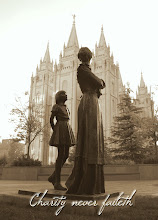
Barbara Woodhead
Winder
1984-1990
To see Barbara Woodhead Winder's testimony click on link below
Barbara Woodhead Winder's testimony
The controversy over the proposed Equal Rights Amendment of the
1970s had divided American women. The 1980s brought more tolerance. “It is a
time to heal,” said Sister Winder, “a time to bond women to women and women to
men. We can have unity in diversity and diversity in unity. We don’t have to be
like one another to enjoy sisterhood.”
Barbara learned early through her own
experience the value of Relief Society visiting teaching and how its emphasis
on serving each other could bless lives. She had been married 11 months when
her first baby was born. “One day, just after we had brought the baby home,”
she recounted, “I had a very high fever. Richard was at work. I had no car, no
phone, and I was terrified.” Thankfully, her visiting teachers stopped by and were
able to get her the help she needed.
During
Barbara’s administration, the general offices of the Young Women and Primary
were moved into the Relief
Society Building
Barbara was released as general president when her husband was
called to be the president of the new Czechoslovakia Prague Mission from 1990
to 1993. The Winders served as the leaders of the Family
History Center
missionaries and later as the first president and matron of the Nauvoo Illinois
Temple
“It is vital that each
sister have visiting teachers, to convey a sense that she is needed, that
someone loves and thinks about her. But equally important is the way the
visiting teacher is able to grow in charity. By assigning our women to do
visiting teaching, we give them the opportunity to develop the pure love of
Christ, which can be the greatest blessing of their lives.”
